Adelaide's Potential to Host the Commonwealth Games: A Report
VerifiedAdded on 2023/06/08
|6
|1847
|252
Report
AI Summary
This report provides a comprehensive analysis of Adelaide's potential to host the Commonwealth Games in 2026 or 2030. It evaluates the suitability of the event based on Getz's outcome-related and process criteria, offering a SWOT analysis of Adelaide as a bidder and host city. The report discusses the potential benefits and drawbacks of Adelaide bidding for the Commonwealth Games, considering factors such as economic impact, tourism, infrastructure development, and potential social and environmental consequences. The analysis concludes with an argument for or against Adelaide's bid, taking into account the city's current standing and future aspirations. The report uses references to support its claims and provide a well-rounded perspective on the topic, available on Desklib for students seeking similar solved assignments and study resources.
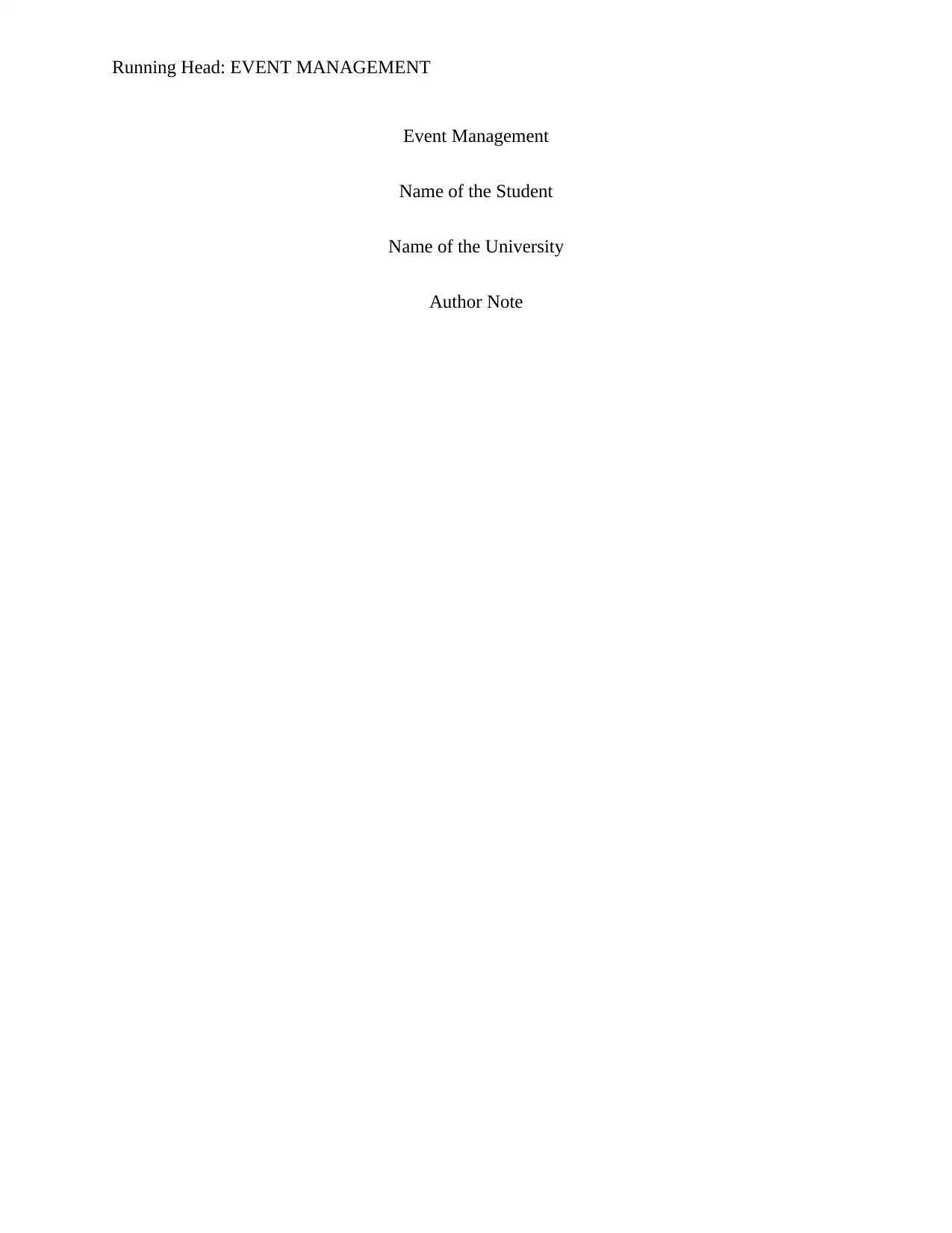
Running Head: EVENT MANAGEMENT
Event Management
Name of the Student
Name of the University
Author Note
Event Management
Name of the Student
Name of the University
Author Note
Paraphrase This Document
Need a fresh take? Get an instant paraphrase of this document with our AI Paraphraser
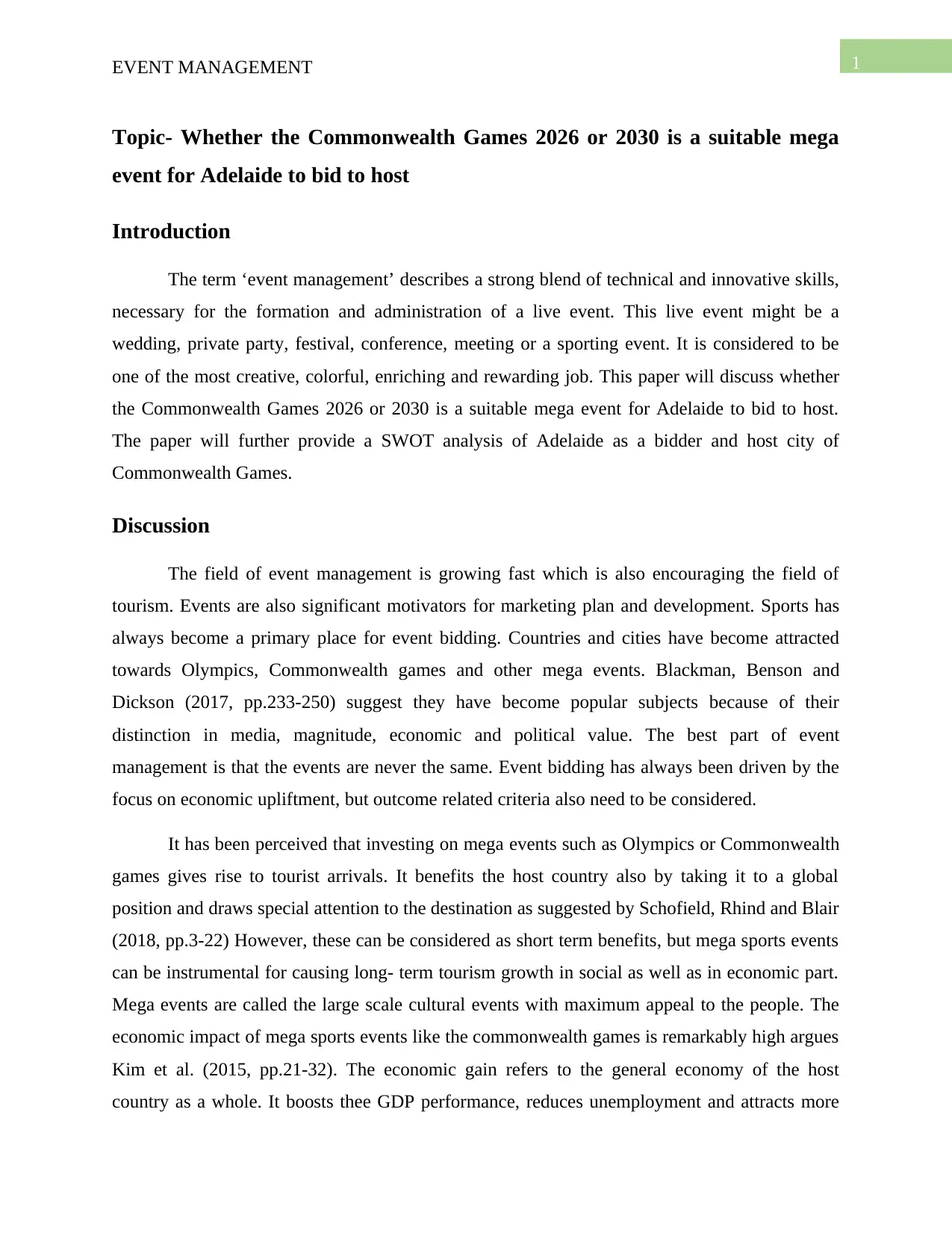
1EVENT MANAGEMENT
Topic- Whether the Commonwealth Games 2026 or 2030 is a suitable mega
event for Adelaide to bid to host
Introduction
The term ‘event management’ describes a strong blend of technical and innovative skills,
necessary for the formation and administration of a live event. This live event might be a
wedding, private party, festival, conference, meeting or a sporting event. It is considered to be
one of the most creative, colorful, enriching and rewarding job. This paper will discuss whether
the Commonwealth Games 2026 or 2030 is a suitable mega event for Adelaide to bid to host.
The paper will further provide a SWOT analysis of Adelaide as a bidder and host city of
Commonwealth Games.
Discussion
The field of event management is growing fast which is also encouraging the field of
tourism. Events are also significant motivators for marketing plan and development. Sports has
always become a primary place for event bidding. Countries and cities have become attracted
towards Olympics, Commonwealth games and other mega events. Blackman, Benson and
Dickson (2017, pp.233-250) suggest they have become popular subjects because of their
distinction in media, magnitude, economic and political value. The best part of event
management is that the events are never the same. Event bidding has always been driven by the
focus on economic upliftment, but outcome related criteria also need to be considered.
It has been perceived that investing on mega events such as Olympics or Commonwealth
games gives rise to tourist arrivals. It benefits the host country also by taking it to a global
position and draws special attention to the destination as suggested by Schofield, Rhind and Blair
(2018, pp.3-22) However, these can be considered as short term benefits, but mega sports events
can be instrumental for causing long- term tourism growth in social as well as in economic part.
Mega events are called the large scale cultural events with maximum appeal to the people. The
economic impact of mega sports events like the commonwealth games is remarkably high argues
Kim et al. (2015, pp.21-32). The economic gain refers to the general economy of the host
country as a whole. It boosts thee GDP performance, reduces unemployment and attracts more
Topic- Whether the Commonwealth Games 2026 or 2030 is a suitable mega
event for Adelaide to bid to host
Introduction
The term ‘event management’ describes a strong blend of technical and innovative skills,
necessary for the formation and administration of a live event. This live event might be a
wedding, private party, festival, conference, meeting or a sporting event. It is considered to be
one of the most creative, colorful, enriching and rewarding job. This paper will discuss whether
the Commonwealth Games 2026 or 2030 is a suitable mega event for Adelaide to bid to host.
The paper will further provide a SWOT analysis of Adelaide as a bidder and host city of
Commonwealth Games.
Discussion
The field of event management is growing fast which is also encouraging the field of
tourism. Events are also significant motivators for marketing plan and development. Sports has
always become a primary place for event bidding. Countries and cities have become attracted
towards Olympics, Commonwealth games and other mega events. Blackman, Benson and
Dickson (2017, pp.233-250) suggest they have become popular subjects because of their
distinction in media, magnitude, economic and political value. The best part of event
management is that the events are never the same. Event bidding has always been driven by the
focus on economic upliftment, but outcome related criteria also need to be considered.
It has been perceived that investing on mega events such as Olympics or Commonwealth
games gives rise to tourist arrivals. It benefits the host country also by taking it to a global
position and draws special attention to the destination as suggested by Schofield, Rhind and Blair
(2018, pp.3-22) However, these can be considered as short term benefits, but mega sports events
can be instrumental for causing long- term tourism growth in social as well as in economic part.
Mega events are called the large scale cultural events with maximum appeal to the people. The
economic impact of mega sports events like the commonwealth games is remarkably high argues
Kim et al. (2015, pp.21-32). The economic gain refers to the general economy of the host
country as a whole. It boosts thee GDP performance, reduces unemployment and attracts more
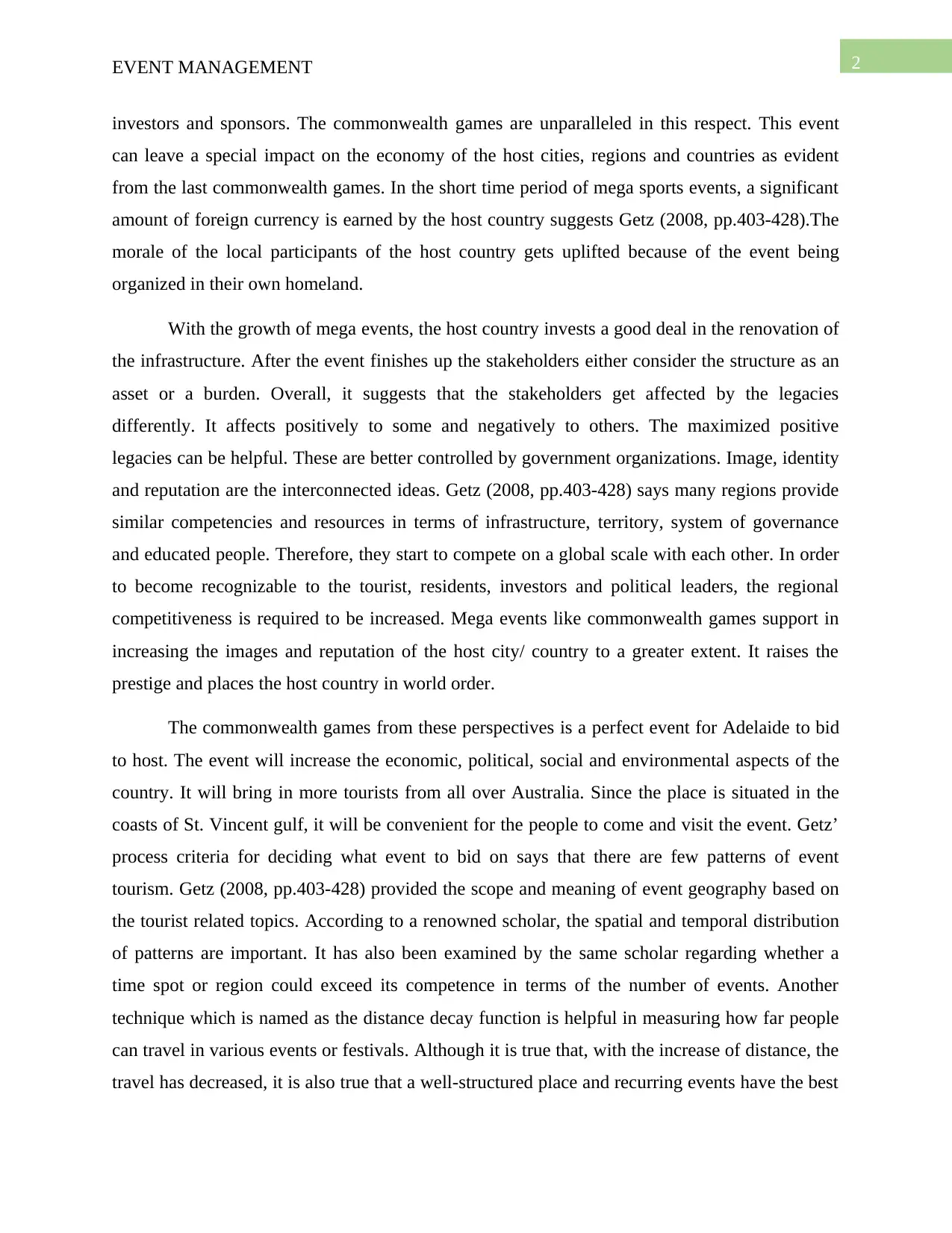
2EVENT MANAGEMENT
investors and sponsors. The commonwealth games are unparalleled in this respect. This event
can leave a special impact on the economy of the host cities, regions and countries as evident
from the last commonwealth games. In the short time period of mega sports events, a significant
amount of foreign currency is earned by the host country suggests Getz (2008, pp.403-428).The
morale of the local participants of the host country gets uplifted because of the event being
organized in their own homeland.
With the growth of mega events, the host country invests a good deal in the renovation of
the infrastructure. After the event finishes up the stakeholders either consider the structure as an
asset or a burden. Overall, it suggests that the stakeholders get affected by the legacies
differently. It affects positively to some and negatively to others. The maximized positive
legacies can be helpful. These are better controlled by government organizations. Image, identity
and reputation are the interconnected ideas. Getz (2008, pp.403-428) says many regions provide
similar competencies and resources in terms of infrastructure, territory, system of governance
and educated people. Therefore, they start to compete on a global scale with each other. In order
to become recognizable to the tourist, residents, investors and political leaders, the regional
competitiveness is required to be increased. Mega events like commonwealth games support in
increasing the images and reputation of the host city/ country to a greater extent. It raises the
prestige and places the host country in world order.
The commonwealth games from these perspectives is a perfect event for Adelaide to bid
to host. The event will increase the economic, political, social and environmental aspects of the
country. It will bring in more tourists from all over Australia. Since the place is situated in the
coasts of St. Vincent gulf, it will be convenient for the people to come and visit the event. Getz’
process criteria for deciding what event to bid on says that there are few patterns of event
tourism. Getz (2008, pp.403-428) provided the scope and meaning of event geography based on
the tourist related topics. According to a renowned scholar, the spatial and temporal distribution
of patterns are important. It has also been examined by the same scholar regarding whether a
time spot or region could exceed its competence in terms of the number of events. Another
technique which is named as the distance decay function is helpful in measuring how far people
can travel in various events or festivals. Although it is true that, with the increase of distance, the
travel has decreased, it is also true that a well-structured place and recurring events have the best
investors and sponsors. The commonwealth games are unparalleled in this respect. This event
can leave a special impact on the economy of the host cities, regions and countries as evident
from the last commonwealth games. In the short time period of mega sports events, a significant
amount of foreign currency is earned by the host country suggests Getz (2008, pp.403-428).The
morale of the local participants of the host country gets uplifted because of the event being
organized in their own homeland.
With the growth of mega events, the host country invests a good deal in the renovation of
the infrastructure. After the event finishes up the stakeholders either consider the structure as an
asset or a burden. Overall, it suggests that the stakeholders get affected by the legacies
differently. It affects positively to some and negatively to others. The maximized positive
legacies can be helpful. These are better controlled by government organizations. Image, identity
and reputation are the interconnected ideas. Getz (2008, pp.403-428) says many regions provide
similar competencies and resources in terms of infrastructure, territory, system of governance
and educated people. Therefore, they start to compete on a global scale with each other. In order
to become recognizable to the tourist, residents, investors and political leaders, the regional
competitiveness is required to be increased. Mega events like commonwealth games support in
increasing the images and reputation of the host city/ country to a greater extent. It raises the
prestige and places the host country in world order.
The commonwealth games from these perspectives is a perfect event for Adelaide to bid
to host. The event will increase the economic, political, social and environmental aspects of the
country. It will bring in more tourists from all over Australia. Since the place is situated in the
coasts of St. Vincent gulf, it will be convenient for the people to come and visit the event. Getz’
process criteria for deciding what event to bid on says that there are few patterns of event
tourism. Getz (2008, pp.403-428) provided the scope and meaning of event geography based on
the tourist related topics. According to a renowned scholar, the spatial and temporal distribution
of patterns are important. It has also been examined by the same scholar regarding whether a
time spot or region could exceed its competence in terms of the number of events. Another
technique which is named as the distance decay function is helpful in measuring how far people
can travel in various events or festivals. Although it is true that, with the increase of distance, the
travel has decreased, it is also true that a well-structured place and recurring events have the best
⊘ This is a preview!⊘
Do you want full access?
Subscribe today to unlock all pages.

Trusted by 1+ million students worldwide
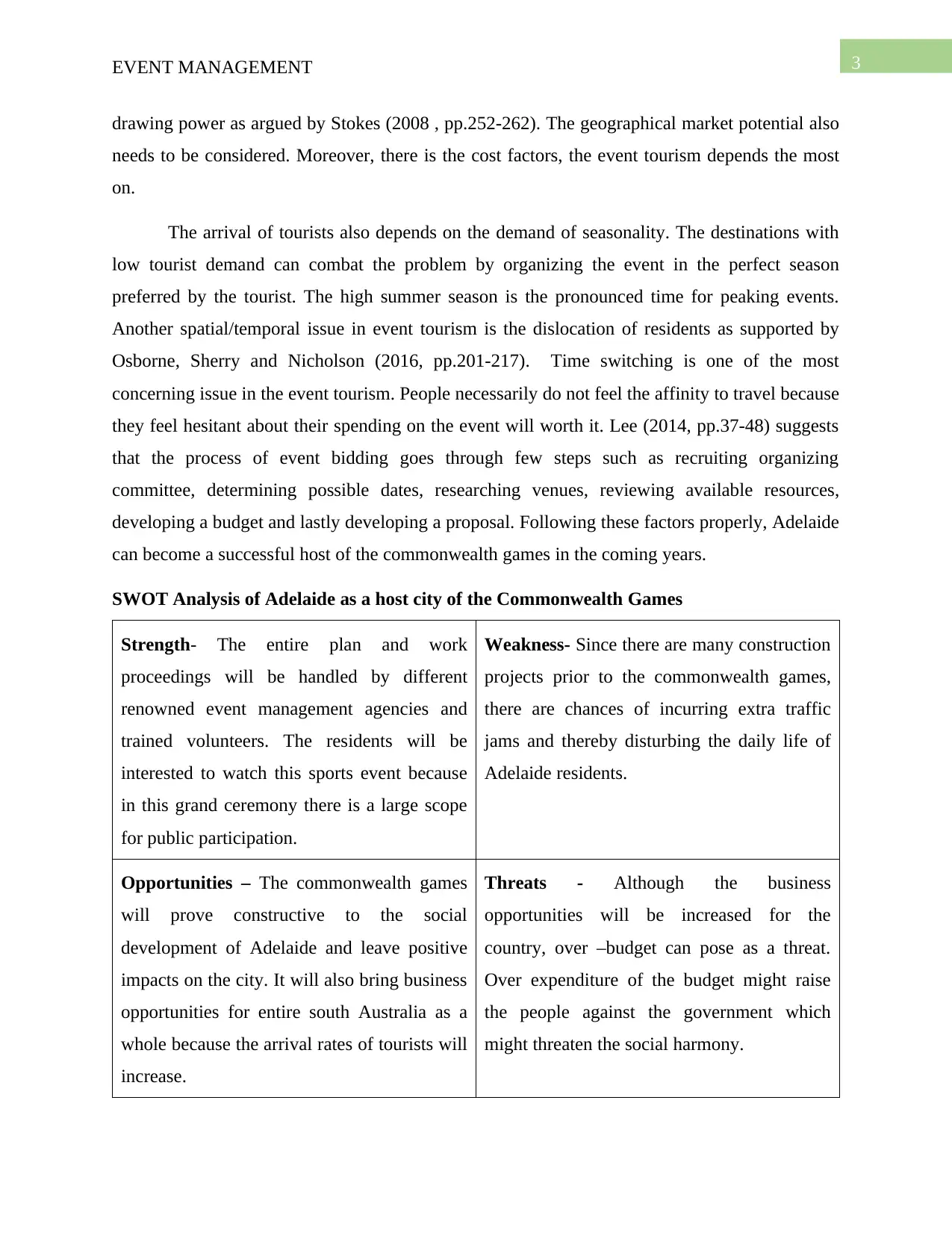
3EVENT MANAGEMENT
drawing power as argued by Stokes (2008 , pp.252-262). The geographical market potential also
needs to be considered. Moreover, there is the cost factors, the event tourism depends the most
on.
The arrival of tourists also depends on the demand of seasonality. The destinations with
low tourist demand can combat the problem by organizing the event in the perfect season
preferred by the tourist. The high summer season is the pronounced time for peaking events.
Another spatial/temporal issue in event tourism is the dislocation of residents as supported by
Osborne, Sherry and Nicholson (2016, pp.201-217). Time switching is one of the most
concerning issue in the event tourism. People necessarily do not feel the affinity to travel because
they feel hesitant about their spending on the event will worth it. Lee (2014, pp.37-48) suggests
that the process of event bidding goes through few steps such as recruiting organizing
committee, determining possible dates, researching venues, reviewing available resources,
developing a budget and lastly developing a proposal. Following these factors properly, Adelaide
can become a successful host of the commonwealth games in the coming years.
SWOT Analysis of Adelaide as a host city of the Commonwealth Games
Strength- The entire plan and work
proceedings will be handled by different
renowned event management agencies and
trained volunteers. The residents will be
interested to watch this sports event because
in this grand ceremony there is a large scope
for public participation.
Weakness- Since there are many construction
projects prior to the commonwealth games,
there are chances of incurring extra traffic
jams and thereby disturbing the daily life of
Adelaide residents.
Opportunities – The commonwealth games
will prove constructive to the social
development of Adelaide and leave positive
impacts on the city. It will also bring business
opportunities for entire south Australia as a
whole because the arrival rates of tourists will
increase.
Threats - Although the business
opportunities will be increased for the
country, over –budget can pose as a threat.
Over expenditure of the budget might raise
the people against the government which
might threaten the social harmony.
drawing power as argued by Stokes (2008 , pp.252-262). The geographical market potential also
needs to be considered. Moreover, there is the cost factors, the event tourism depends the most
on.
The arrival of tourists also depends on the demand of seasonality. The destinations with
low tourist demand can combat the problem by organizing the event in the perfect season
preferred by the tourist. The high summer season is the pronounced time for peaking events.
Another spatial/temporal issue in event tourism is the dislocation of residents as supported by
Osborne, Sherry and Nicholson (2016, pp.201-217). Time switching is one of the most
concerning issue in the event tourism. People necessarily do not feel the affinity to travel because
they feel hesitant about their spending on the event will worth it. Lee (2014, pp.37-48) suggests
that the process of event bidding goes through few steps such as recruiting organizing
committee, determining possible dates, researching venues, reviewing available resources,
developing a budget and lastly developing a proposal. Following these factors properly, Adelaide
can become a successful host of the commonwealth games in the coming years.
SWOT Analysis of Adelaide as a host city of the Commonwealth Games
Strength- The entire plan and work
proceedings will be handled by different
renowned event management agencies and
trained volunteers. The residents will be
interested to watch this sports event because
in this grand ceremony there is a large scope
for public participation.
Weakness- Since there are many construction
projects prior to the commonwealth games,
there are chances of incurring extra traffic
jams and thereby disturbing the daily life of
Adelaide residents.
Opportunities – The commonwealth games
will prove constructive to the social
development of Adelaide and leave positive
impacts on the city. It will also bring business
opportunities for entire south Australia as a
whole because the arrival rates of tourists will
increase.
Threats - Although the business
opportunities will be increased for the
country, over –budget can pose as a threat.
Over expenditure of the budget might raise
the people against the government which
might threaten the social harmony.
Paraphrase This Document
Need a fresh take? Get an instant paraphrase of this document with our AI Paraphraser
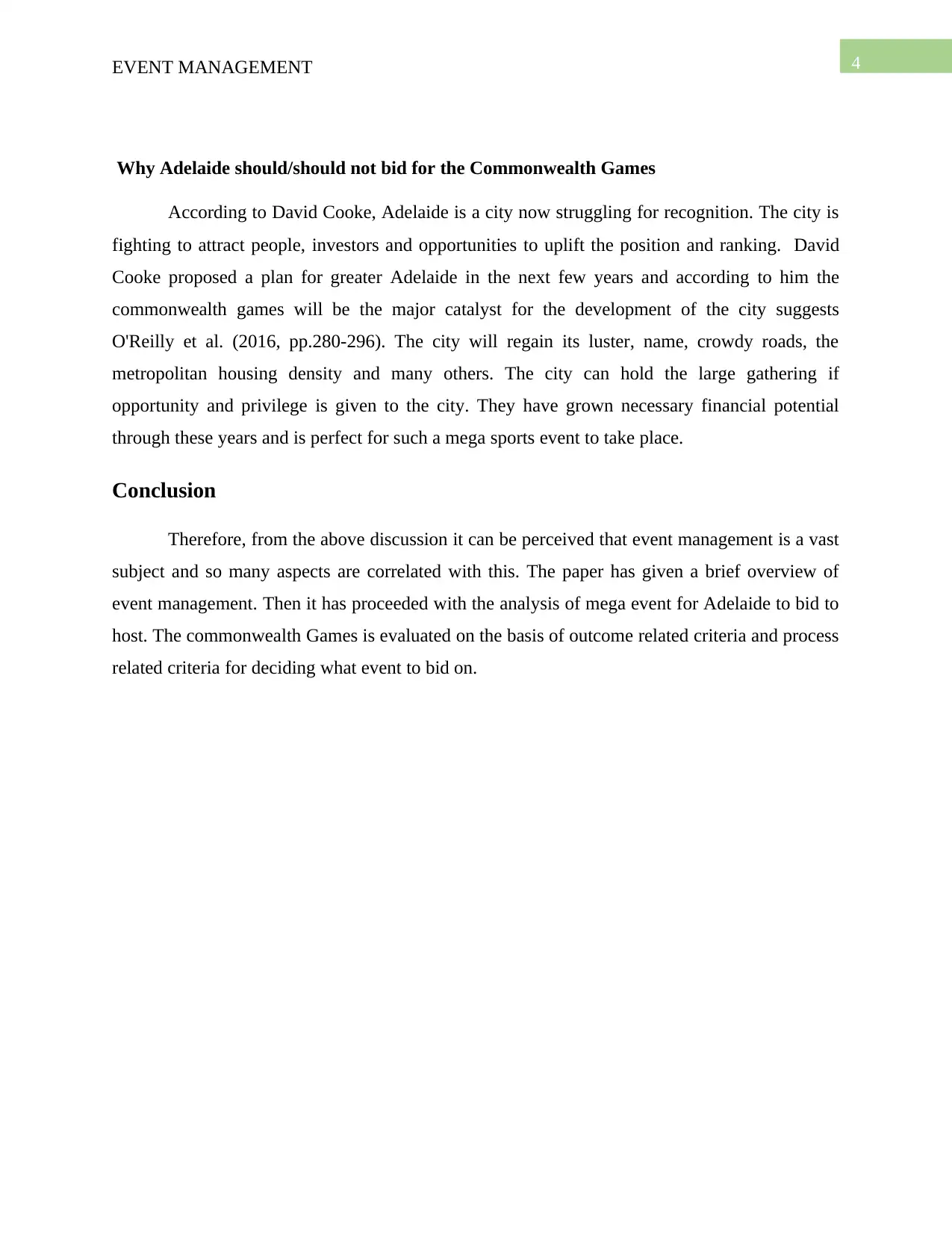
4EVENT MANAGEMENT
Why Adelaide should/should not bid for the Commonwealth Games
According to David Cooke, Adelaide is a city now struggling for recognition. The city is
fighting to attract people, investors and opportunities to uplift the position and ranking. David
Cooke proposed a plan for greater Adelaide in the next few years and according to him the
commonwealth games will be the major catalyst for the development of the city suggests
O'Reilly et al. (2016, pp.280-296). The city will regain its luster, name, crowdy roads, the
metropolitan housing density and many others. The city can hold the large gathering if
opportunity and privilege is given to the city. They have grown necessary financial potential
through these years and is perfect for such a mega sports event to take place.
Conclusion
Therefore, from the above discussion it can be perceived that event management is a vast
subject and so many aspects are correlated with this. The paper has given a brief overview of
event management. Then it has proceeded with the analysis of mega event for Adelaide to bid to
host. The commonwealth Games is evaluated on the basis of outcome related criteria and process
related criteria for deciding what event to bid on.
Why Adelaide should/should not bid for the Commonwealth Games
According to David Cooke, Adelaide is a city now struggling for recognition. The city is
fighting to attract people, investors and opportunities to uplift the position and ranking. David
Cooke proposed a plan for greater Adelaide in the next few years and according to him the
commonwealth games will be the major catalyst for the development of the city suggests
O'Reilly et al. (2016, pp.280-296). The city will regain its luster, name, crowdy roads, the
metropolitan housing density and many others. The city can hold the large gathering if
opportunity and privilege is given to the city. They have grown necessary financial potential
through these years and is perfect for such a mega sports event to take place.
Conclusion
Therefore, from the above discussion it can be perceived that event management is a vast
subject and so many aspects are correlated with this. The paper has given a brief overview of
event management. Then it has proceeded with the analysis of mega event for Adelaide to bid to
host. The commonwealth Games is evaluated on the basis of outcome related criteria and process
related criteria for deciding what event to bid on.
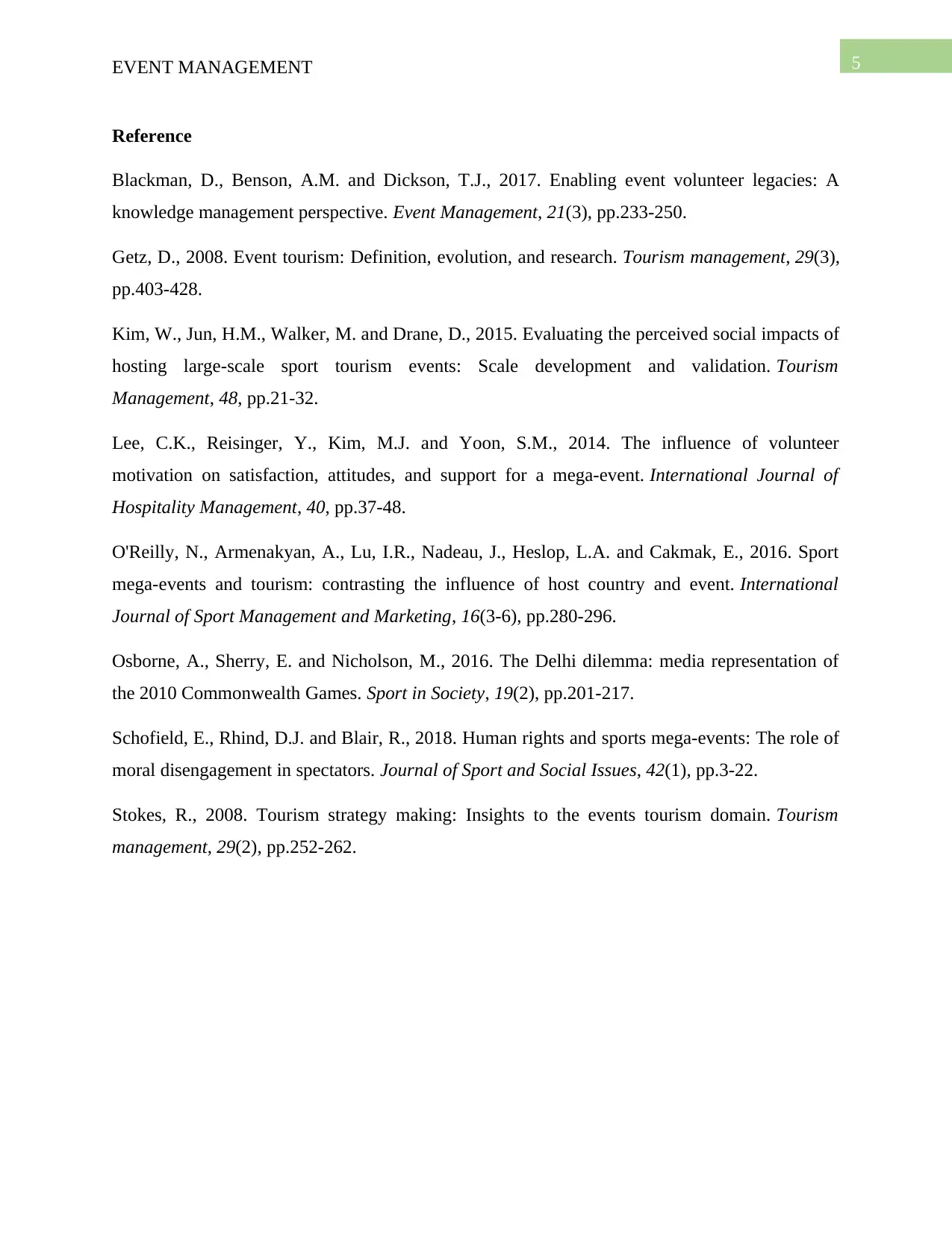
5EVENT MANAGEMENT
Reference
Blackman, D., Benson, A.M. and Dickson, T.J., 2017. Enabling event volunteer legacies: A
knowledge management perspective. Event Management, 21(3), pp.233-250.
Getz, D., 2008. Event tourism: Definition, evolution, and research. Tourism management, 29(3),
pp.403-428.
Kim, W., Jun, H.M., Walker, M. and Drane, D., 2015. Evaluating the perceived social impacts of
hosting large-scale sport tourism events: Scale development and validation. Tourism
Management, 48, pp.21-32.
Lee, C.K., Reisinger, Y., Kim, M.J. and Yoon, S.M., 2014. The influence of volunteer
motivation on satisfaction, attitudes, and support for a mega-event. International Journal of
Hospitality Management, 40, pp.37-48.
O'Reilly, N., Armenakyan, A., Lu, I.R., Nadeau, J., Heslop, L.A. and Cakmak, E., 2016. Sport
mega-events and tourism: contrasting the influence of host country and event. International
Journal of Sport Management and Marketing, 16(3-6), pp.280-296.
Osborne, A., Sherry, E. and Nicholson, M., 2016. The Delhi dilemma: media representation of
the 2010 Commonwealth Games. Sport in Society, 19(2), pp.201-217.
Schofield, E., Rhind, D.J. and Blair, R., 2018. Human rights and sports mega-events: The role of
moral disengagement in spectators. Journal of Sport and Social Issues, 42(1), pp.3-22.
Stokes, R., 2008. Tourism strategy making: Insights to the events tourism domain. Tourism
management, 29(2), pp.252-262.
Reference
Blackman, D., Benson, A.M. and Dickson, T.J., 2017. Enabling event volunteer legacies: A
knowledge management perspective. Event Management, 21(3), pp.233-250.
Getz, D., 2008. Event tourism: Definition, evolution, and research. Tourism management, 29(3),
pp.403-428.
Kim, W., Jun, H.M., Walker, M. and Drane, D., 2015. Evaluating the perceived social impacts of
hosting large-scale sport tourism events: Scale development and validation. Tourism
Management, 48, pp.21-32.
Lee, C.K., Reisinger, Y., Kim, M.J. and Yoon, S.M., 2014. The influence of volunteer
motivation on satisfaction, attitudes, and support for a mega-event. International Journal of
Hospitality Management, 40, pp.37-48.
O'Reilly, N., Armenakyan, A., Lu, I.R., Nadeau, J., Heslop, L.A. and Cakmak, E., 2016. Sport
mega-events and tourism: contrasting the influence of host country and event. International
Journal of Sport Management and Marketing, 16(3-6), pp.280-296.
Osborne, A., Sherry, E. and Nicholson, M., 2016. The Delhi dilemma: media representation of
the 2010 Commonwealth Games. Sport in Society, 19(2), pp.201-217.
Schofield, E., Rhind, D.J. and Blair, R., 2018. Human rights and sports mega-events: The role of
moral disengagement in spectators. Journal of Sport and Social Issues, 42(1), pp.3-22.
Stokes, R., 2008. Tourism strategy making: Insights to the events tourism domain. Tourism
management, 29(2), pp.252-262.
⊘ This is a preview!⊘
Do you want full access?
Subscribe today to unlock all pages.

Trusted by 1+ million students worldwide
1 out of 6
Related Documents
Your All-in-One AI-Powered Toolkit for Academic Success.
+13062052269
info@desklib.com
Available 24*7 on WhatsApp / Email
![[object Object]](/_next/static/media/star-bottom.7253800d.svg)
Unlock your academic potential
Copyright © 2020–2025 A2Z Services. All Rights Reserved. Developed and managed by ZUCOL.





